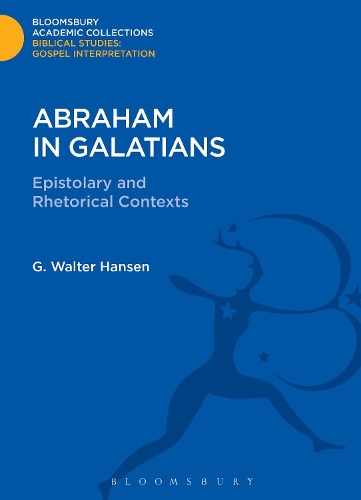
Abraham in Galatians: Epistolary and Rhetorical Contexts
(Hardback)
Publishing Details
Abraham in Galatians: Epistolary and Rhetorical Contexts
By (Author) G. Walter Hansen
Bloomsbury Publishing PLC
Bloomsbury Academic
29th January 2015
United Kingdom
Classifications
Tertiary Education
Non Fiction
Criticism and exegesis of sacred texts
New Testaments
227.406
Physical Properties
Hardback
336
Width 156mm, Height 234mm
644g
Description
This book offers a fresh perspective on Paul's use of the Abraham story in Galatians by providing a thorough analysis of its epistolary and rhetorical contexts. In Part I, parallels in Galatians to rebuke-request letters in Greek papyri serve as a basis for dividing the letter into two major sections: Rebuke (1.6-4.11) and Request (3.12-6.10), the request formula in 4.12 indicating a major turning point in the letter. The Abraham argument (3.6-29) and the Hagar-Sarah allegory (4.12-31) should be viewed as Paul's biblical rebuke and biblical appeal respectively. Rhetorical analysis classifies 1.1-4.11 as forensic rhetoric, characterized by defence and accusations regarding past actions, and 4.12-6.18 as deliberative rhetoric, marked by exhortation and dissuasion regarding future actions. In Part II, exegetical analysis of 3.1-29 stresses the subordination of the Abraham argument to the framework provided by Paul's expressions of the rebuke. Within this framework, the autobiographical section and the Abraham argument section are parallel developments of the thesis statement (1.11-12). Both sections emphasize Paul's missiological concern to preserve the truth of the Gospel for the freedom of Gentile believers. Analysis of 4.21-31 shows how the allegory functions within the request section of the letter as biblical support for the call to resist the troublemakers, setting the stage for the authoritative appeal of 5.13-6.10. From the perspective provided by this analysis, significant implications which relate to broader theological issues in Pauline theology are set forth; the function of Paul's doctrine of justification by faith as the basis for his Gentile mission, Paul's view of the Gentile church as the Israel of God, and the covenantal structure of Paul's ethics which relates to the response of faith to obedience in the divine will. Three appendices evaluate recent discussion of important background issues: The Opponent's Use of the Abraham Tradition, Abraham in Jewish Literature, and Paul and Jewish Exegesis.
